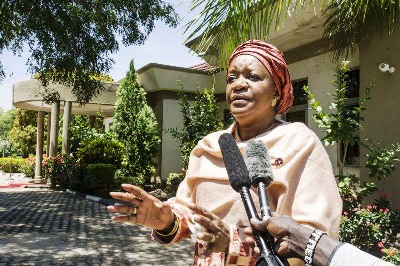UN envoy urges S. Sudan’s warring parties to end sexual violence
October 13, 2014 (JUBA) – South Sudan should prevent rampant sexual violence against women and children by prosecuting culprits involved, a top United Nations official said on Monday.

Bangura, who was on a week-long visit to the country, said her mandate is to provide coherent and strategic leadership around the world on issues of sexual violence.
She travelled to Bentiu, South Sudan’s Unity State capital, to engage with the local commander of the Sudan People´s Liberation Army (SPLA), government authorities, UN staff, humanitarian workers and survivors of sexual violence.
“What I witnessed in Bentiu is the worst I have seen in my almost 30 years in dealing with this issue. This is because of the combination of chronic insecurity, unimaginable living conditions, acute day-to-day protection concerns and rampant sexual violence,” said Bangura.
“The bodies of women and children are the battleground of this conflict. In the words of a woman activist I met: ‘It is not just about rape, it is to inflict unimaginable pain and destruction,’” she added.
Bangura met with South Sudanese President Salva Kiir, ministers, the army, and the police as well as the chairman of the South Sudan Human Rights Commission, women’s groups, community leaders, service providers, journalists and UN staff.
She also met with Riek Machar, the leader of the Sudan People’s Liberation Movement (Opposition) in Ethiopia, to discuss concrete measures that the opposition must take to prevent sexual violence by their forces and in areas under their control.
Both parties, she said, vowed to take steps necessary to prevent and address sexual violence crimes.
“The situation on the ground has gotten worse. Following last December’s escalation of violence, there has been an additional dimension of sexual violence attacks and reprisals on an alarming scale,” said Bangura.
“There are also grave concerns of sexual violence perpetrated along ethnic lines with attacks fuelling reprisals and a cycle of recrimination and revenge,” she added.
According to last year’s UN annual report, sexual violence is still rampant in countries like Bosnia, Colombia, South Sudan, Sudan, Democratic Republic of Congo (DRC), the Central African Republic (CAR), Liberia and Ivory Coast, among others.
In South Sudan, Up to 24,000 women are now at risk of sexual violence in South Sudan, with many women exposed after fleeing into the bush to escape soldiers and rebels, the UN says.
South Sudan signed the UN declaration by 155 countries around the world to fight sexual violence last year.
SEXUAL VIOLENCE A WAR CRIME
The International Criminal Court, Bangura said, identifies sexual violence as one of the crimes probed by the Hague-based court.
“Sexual violence is a war crime and crime against humanity so we should be able to make sure that action is taken against,” said Bangura.
She said the practice was worsened by lack of services for victims of sexual violence, reporting of this crime to security, judicial and social welfare actors because of government offices closures, malfunctioning police services and social stigma associated with sexual violence.
“All these factors contribute to a climate of impunity,” the top UN official.
“The international community cannot leave survivors to fend for themselves. Now is the time to step up and help South Sudan put an end to these atrocities,” the special representative urged.
Meanwhile, a new agreement which outlines critical priority areas for action including ensuring medical, psychosocial and legal assistance to victims; addressing impunity, security and justice sector reform, and ensuring that sexual violence crimes are explicitly addressed in the peace process and as an aspect of the Cessation of Hostilities Agreement was signed between the UN and South Sudan government.
(ST)
